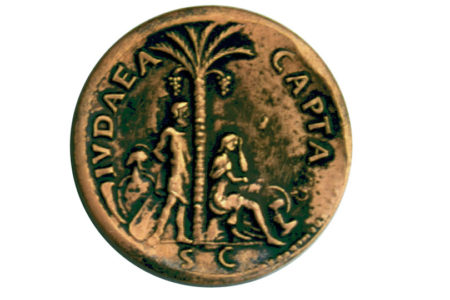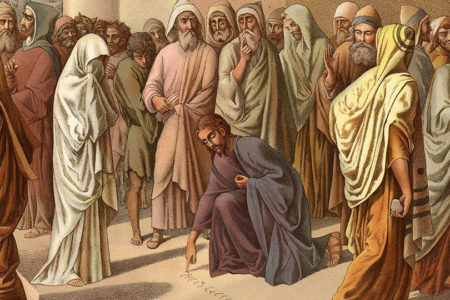Rendering to Caesar—What?
Faith And Politics In The New Testament Age
If you believe in the Lord Jesus as your Savior, I ask you the following question: Are you a Christian American, or are you an American Christian? You may answer with some perplexity, “What’s the difference?” Well, pondering the answer to that question involves more than just playing a game with words. In the phrase Christian American, the operative word is American and the modifier is Christian. In the phrase American Christian, the operative word is Christian and the modifier is American. Is there a difference worth noting?
For years now, some patriotic Christians have proudly borne the title Christian Americans without realizing the subtle way in which they may unintentionally be denying their calling as citizens of heaven (see Phil. 3:20; 1 Pet. 2:11). True believers have been translated from this earthly kingdom (Col. 1:13). That does not mean that we should drop out of this world. We are to submit to the government, pay our taxes to it, and obey its laws. Jesus told us to “Render…unto Cæsar the things which are Cæsar’s” (Mt. 22:21). It is not always easy to decide where to draw the line between our duty to the government and our duty to our Lord. But one thing we cannot deny: Our allegiance, first and foremost, is to the sovereign King of heaven. That is why we are Christians who happen to be Americans (or Canadians, or Israelis, or wherever), not Americans who happen to be Christians.
It is encouraging to know that this is not a new problem, but one that was faced by Jews and Christians in biblical days as well. During the first century A.D., an individual’s relationship to the ruling power (i.e., Rome) was an issue that divided the Jewish people who first heard the message of Jesus. Understanding this ancient problem may help us to more intelligently decide what our duty should be to our own government, regardless of the country in which we live.
Jewish Political Shifts
As is usually the case, an understanding of what led up to the political situation in the New Testament will help us sort out the options faced by the Jewish people as they listened to Jesus’ message.
The heights of glory of Old Testament Israelites occurred during the heady days of King David and his son, King Solomon, in the tenth century B.C. Even when the united kingdom split in 930 B.C., the kingdom of Judah continued under a series of 20 monarchs until it came crashing down in the destruction caused by the Babylonians in 586 B.C. The returning exiles under Zerubbabel were allowed a measure of freedom but still remained subservient to another nation. Under the Persians and their Greek successors, any Jewish hopes of a renewed kingdom seemed to be a pipe dream. The heroic rebellion of the Hasmoneans, prompted by Syrian persecution, eventually led to an independent Jewish kingdom. However, it was a kingdom led, not by a Davidic heir, but by a priestly dynasty that began well but soon floundered in its own arrogance and desire for power and territory.
Two of these Hasmonean brothers argued and fought for power so much that the new, great power from the West, the Romans, finally stepped in and took control of Israel and Jerusalem in 63 B.C. That Roman rule continued well into the Christian era and eventually had to deal with the Christian message. Therefore, during the days when Jesus was born, the Roman Emperor Augustus was ruling little Judea as one of the many regions of his far-flung empire. There were Roman soldiers everywhere, commanded by centurions, and all answered to a procurator who managed the entire realm from the port of Cæsarea on the Mediterranean coast.
Davidic glory and Hasmonean heydays were only faint memories in the Jewish consciousness, while the oppressive rule of a foreign power was a daily reality. Every Jewish person in Israel faced choices in responding to the situation. The spectrum of responses to that Roman rule provides some striking illustrations of people in all ages and countries relating their faith to the political realities of their situations.
Jewish Political Choices
Two political choices faced the Jewish people in Judea under Roman rule: submit or rebel. Those choices were personified by two sects that were active during the period: the Herodians and the Zealots. This is not to say that every Jew belonged to one or the other of these fraternities. Actually, they each had very few members, as such. But the Herodians and the Zealots exemplified the extreme ways in which conquered peoples have always reacted to foreign rulers. Who were these Jewish sectaries and how did they respond to Jesus’ unique message of salvation?
The Herodians are mentioned only twice in the Gospels: once in Galilee (Mk. 3:6) and once in Jerusalem (Mk. 12:13; Mt. 22:16). In each instance, they agreed with the Pharisees in their opposition to Jesus. While they agreed with the Pharisees in their religious views, they were distinct from them in their political beliefs. The Pharisees tended to be nonpolitical and more concerned with the Mosaic and Oral Law and its application.
As indicated by their name, the Herodians must have been active supporters of Roman rule. The Emperor Augustus was wise enough to know that a subject people could be kept under better control if the one immediately governing them was a puppet ruler from among the people themselves. Therefore, he appointed Herod, who was of nominal Jewish background being a descendant of forced converts to the Jewish faith. Herod, his sons, and their sons ruled over the Jewish people in Judea, Samaria, and Galilee for more than a century. Their rule, however, was exercised by the permission and with the blessing of Rome. The Herodian dynasty was a symbol of Roman rule over a subjugated people. Those who actively supported the Roman domination of Judea manifested that support by their devotion to Rome’s puppets, the Herods. Hence, they were known as Herodians.
The ideas of the Herodians can best be illustrated by the question they put to Jesus in Matthew 22. This chapter relates how various groups came to Jesus and asked Him a question with the purpose of ensnaring Him by an inappropriate answer.
And they sent out unto him their disciples with the Herodians, saying, Master, we know that thou art true, and teachest the way of God in truth, neither carest thou for any man; for thou regardest not the person of men. Tell us, therefore, What thinkest thou? Is it lawful to give tribute unto Cæsar, or not? But Jesus perceived their wickedness, and said, Why test me, ye hypocrites? Show me the tribute money. And they brought unto him a denarius. And he saith unto them, Whose is this image and superscription? They say unto him, Cæsar’s. Then saith he unto them, Render, therefore, unto Cæsar the things which are Cæsar’s; and unto God, the things that are God’s. When they had heard these words, they marveled, and left him, and went their way (vv. 16–22).
How appropriate that a group that strongly supported Cæsar’s rule over the Jews should ask Him a question about paying taxes to the government of Cæsar. This question raised an issue that was actually one of the hottest topics of the day among the Jewish populace. It is important to understand the motivation of these questioning groups in Matthew 22. They were not sincerely asking for Jesus’ opinion on certain topics. This is evident from the verse immediately preceding the incident: “Then went the Pharisees, and took counsel how they might entangle him in his talk” (v. 15). The Herodians and their encouragers wanted to catch Jesus on the horns of a dilemma. If He opposed paying taxes, they would report Him to the Roman authorities. If He boldly supported the payment, then they hoped He would lose favor with the people. Jesus’ answer was a marvel of wisdom that has set the example for His followers for nearly two thousand years. Like it or not, we must pay our taxes…Our souls, however, are stamped with God’s image—it is to Him that we must pay our spiritual obedience.
On the opposite end of the political spectrum from the Herodians were those who just as strongly opposed Roman rule over the Jewish people. Known as the Zealots, after the zealous Phinehas of Old Testament fame (Num. 25:11–13), they not only opposed the Romans, they fought against them with all their might. They were guerrilla fighters, attacking and killing Roman soldiers at every opportunity. To some, they were terrorists, and to others, freedom fighters. Founded in 6 A.D. as a result of another unwelcome taxation by the Romans, the Zealots carried the war against the Romans underground with whatever arms they could secure (see Acts 5:37). They eventually led the nation into open armed rebellion against Rome in 66 A.D. The Zealots, however, along with thousands of others, perished in the battles of Gamla and the destructions of Jerusalem (70 A.D.) and Masada (73 A.D.). Barabbas and his two fellow prisoners, who were crucified with Jesus, were undoubtedly also part of the Zealots. Some think that Judas was at least in sympathy with their goals and that this contributed to his decision to betray Jesus when it became evident that the Master did not encourage such extreme political views.
Another Zealot hothead, however, must have seen the light taught by the true Messiah and abandoned his radical ways. He is mentioned in the Scriptures as “Simon the Zealot” (Acts 1:13; Mt. 10:4).
To these sincere but misguided political warriors of His day, Jesus offered the following words: “Put up again thy sword into its place; for all they that take the sword shall perish with the sword” (Mt. 26:52). And again, “My kingdom is not of this world; if my kingdom were of this world, then would my servants fight, that I should not be delivered to the Jews; but now is my kingdom not from here” (Jn. 18:36). The military failure of the Zealots in the wars with the Romans, compared with the spiritual victory of the gospel, graphically illustrates the superior power of the latter over the former.
Jesus did not allow Himself to get caught up in the political rivalries and temporal conflicts of His contemporaries. He and His message transcended such issues, which were so important to those whose view is only of earthly things. Jesus taught the Herodians—and us—that as citizens of any country, we have a higher obligation to our own King, whose image we bear. If duties to God and “Cæsar” conflict, there is no doubt where our obedience must lie, even if we have to suffer for that choice. On the other hand, He taught the Zealots—and us—that freedom from physical bondage to others does not produce the lasting spiritual freedom so desperately needed by all mankind. “Cæsar” is not our ultimate enemy. As the cartoon character remarked, “We have found the enemy—and he is us!”
By Jesus’ spiritual power, we can conquer our worst enemy: our own sinful hearts.
People of faith will continue to search for the ideal balance between faith and politics. However, our faithfulness to Him who is sovereign over all earthly rulers—the King of kings and Lord of lords—will always tip the scales.







